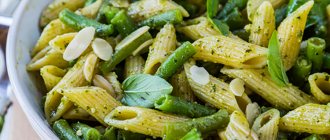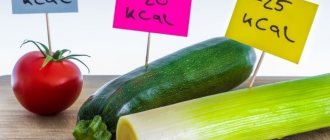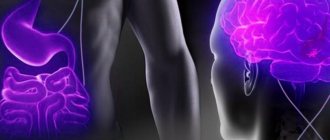General information
All foods rich in fast carbohydrates must be eaten in the morning and afternoon. This is due to the fact that in the early days the body easily processes them into energy. It is advisable to eat fruits and berries, such as bananas, before 18:00 in the evening, otherwise even they, due to their high sugar content, can contribute to the gain of extra pounds.
People seeking to maintain a healthy, balanced diet need to reduce their intake of foods high in fast carbohydrates to a minimum.
In the case of fast carbohydrates, it is impossible to categorically exclude them from the diet, but it is necessary to remember that many products are interchangeable. For example, it is better to replace sugar and chocolate with honey and dried fruits. This is due to the fact that sugar does not contain useful substances, while honey and dried fruits in small quantities can be quite useful.
If the carbohydrate content is the same, the choice should be made in favor of foods that benefit the body.
The most popular foods high in fast carbohydrates include:
- Bread and baked goods;
- Confectionery;
- Grape;
- Potato;
- Processed rice;
- Beekeeping products;
- Cereals;
- Confitures;
- Jam;
- Any type of sugar;
- Dried fruits.
Types of carbohydrates
Carbohydrates include a wide class of organic compounds, which, depending on their structure (molecular composition), are divided into several types:
- Monosaccharides are the smallest units (molecules) of carbohydrates. The most common monosaccharides in foods are glucose, galactose, and fructose.
- Oligosaccharides are chemical compounds containing from 2 to 12 molecules (disaccharides, trisaccharides). Oligosaccharides in human nutrition are presented in the form of cane and beet sugar.
- Polysaccharides are high molecular weight compounds, including from ten to several thousand monosaccharides. Examples of polysaccharides are starch and fiber.
The chemical structure of saccharides determines the rate of absorption and the effect of carbohydrates on the body, therefore it is the main factor in the division of carbohydrates into:
- fast (mono- and oligosaccharides, as well as non-resistant starches) - characterized by rapid absorption due to their simple chemical structure that does not require splitting.
- slow - represented by polysaccharides in the form of stable (resistant) starch and insoluble fiber, which undergo a long process of breakdown into monosaccharides before absorption.
Distinctive characteristics of foods high in fast carbohydrates
If you don’t delve into the essence of the chemical composition, you can identify a high-carbohydrate food by simple signs:
- It has a pronounced, often not entirely natural taste;
- Made using baking or confectionery flour;
- Before reaching the consumer’s table, it undergoes significant processing at the enterprise;
- The composition contains an increased amount of sugar (it does not matter whether this sugar was added at the enterprise or whether the product in its original form contains a lot of glucose);
- The satiety from such food quickly comes and goes;
- The joy of eating such food quickly gives way to regret.
Among the products that we are accustomed to consider useful for the figure, there are a lot of those whose fast carbohydrate content is prohibitively high:
Muesli and cereals, breakfast cereals, yogurts with fillings, fruit bars, store-bought juices, low-calorie soda. All these products are designed to quickly satisfy hunger and thirst, but they contain too much excess sugar, which leads to sharp spikes in insulin in the blood.
Vegetables, which occupy the main place in the diet of those losing weight, can also lead to a set of extra pounds due to their high carbohydrate content. Therefore, overweight people should avoid excessive consumption of sweet carrots, rutabaga, beans and pumpkin.
According to scientific research, vegetables in red and yellow shades contain more fast carbohydrates than green ones.
The benefits and harms of fast carbohydrates
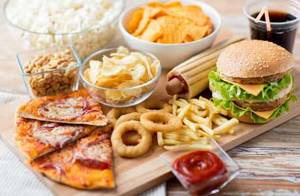
Due to such a beneficial property as the ability to restore energy, products containing fast carbohydrates can be used after sports or heavy physical labor, as well as when providing first aid in case of fainting.
Daily consumption of fast carbohydrates is accompanied by many negative effects that have a detrimental effect on the endocrine system, namely:
- blood sugar fluctuations;
- depletion of the pancreas;
- stopping lipolysis (breakdown of fat cells) in the body;
- development of cell resistance (insensitivity) to insulin;
- development of glycation processes - changes in cell structure (strong “gluing” of collagen and elastin) in the process of a chemical reaction between amino acids and glucose (or fructose), which leads to loss of elasticity and aging of the skin after 30 years;
- deterioration of health 30-40 minutes after eating as a result of the development of hypoglycemia.
Also, the presence of fast carbohydrates in the diet when losing weight blocks the process of breaking down adipose tissue, and leads to weight gain in cases where the daily caloric intake exceeds the norm.
In some cases, it is recommended to exclude fast carbohydrates from the diet, especially sugar and white flour, in order to avoid negative effects on the endocrine system in diseases and conditions such as:
- Type 2 diabetes mellitus is a dysfunction of the pancreas, accompanied by insufficient production of the hormone insulin and a constant state of hyperglycemia after consuming fast carbohydrates,
- Insulin resistance is a pathological condition (prediabetes) with loss of cellular sensitivity to insulin, causing excessive pancreatic activity, and is also accompanied by cellular starvation and gain of fat mass,
- Excess body weight (pre-obesity) – increase in body mass index, up to 25-30 points (calculated based on gender and height),
- Obesity of all degrees is a pathological accumulation of fat deposits, leading to the development of cardiovascular diseases, diabetes, physical inactivity and other negative consequences.
- Polycystic ovary syndrome is a dysfunction of the ovaries, accompanied by increased production of sex hormones (androgens and estrogens). PCOS leads to impaired cell sensitivity to glucose, insulin resistance and a high risk of developing diabetes in women under 40 years of age.
- Acne (acne) is an inflammatory disease of the hair follicles and sebaceous glands, manifested by many rashes and blackheads on the skin of the face and chest. The suspected causes of acne are hormonal imbalances.
List of foods high in fast carbohydrates
Harmful not only to the figure, but also to the entire body as a whole:
- Sweet juices and cola;
- Baking (with a lot of sugar and fat);
- Sugar and milk chocolate;
- Bars and chocolates;
- Beer and other alcohol;
- Chips.
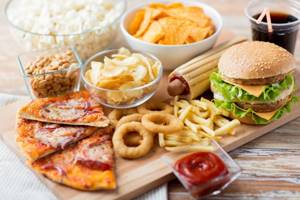
You should try to minimize the consumption of such products. In addition, even completely abandoning them will not cause harm.
You should include in your diet:
- Squash caviar;
- Sweet vegetables;
- Sweet fruits;
- Compote;
- Watermelon;
- Starch;
- Potatoes in any form;
- Sticky rice;
- Honey;
- Dried fruits.
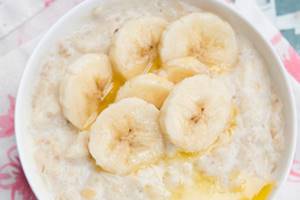
These products are quickly absorbed by the body and can provoke weight gain, but they must be included in your diet in reasonable quantities.
After training, many athletes use special mixtures from sports nutrition stores - gainers. They contain fast carbohydrates. They are necessary for the body to recover from increased strength loads and, when added to the diet, promote active muscle growth. And the faster the process of recovery of the body and muscles, the more intense the next workout can be.
Fast carbohydrates food table + GI
Fast carbohydrates food table
| Fast carbohydrates | Glycemic index |
| Grapefruit | 20 |
| Apple | 30 |
| Coconut flour | 35 |
| Whole grain bread | 45 |
| Persimmon | 50 |
| Bananas | 65 |
| Boiled potatoes | 65 |
| Canned corn | 65 |
| Melon | 65 |
| Ice cream | 70 |
| White sugar | 70 |
| Milk chocolate | 70 |
| Pasta from soft wheat varieties | 70 |
| Muesli | 80 |
| Mashed potatoes | 80 |
| Cornflakes | 85 |
| White bread | 85 |
| Wheat flour | 90 |
| Rice noodles | 95 |
| French fries | 95 |
| Cakes, pastries | 100 |
| Dates | 146 |
Final conclusions
If fast carbohydrates predominate in a person’s diet, then the level of glucose in his blood constantly sharply increases. If the load on the body is insufficient, excess carbohydrates are converted into fat reserves.
This risk group includes lovers of sweets, baked goods, sweet soda, as well as potatoes, instant cereals and many other “goodies.” If there are too many fast carbohydrates in the diet and not enough slow carbohydrates, metabolic problems inevitably begin: excess weight and related diseases appear.
Let baked goods and jams on top of a piece of white toast, bars and french fries become your holiday diet. Be especially wary of fast carbohydrates before bed, when they pose the greatest threat to your beauty and figure.
Eating foods with a low glycemic index will help you lose weight and feel lighter throughout the day. Lose weight with a diet that includes healthy foods on your grocery list. A slender, attractive body is worth giving up harmful excesses for.
The rules of a healthy, nutritious diet say: everything should be in moderation. You must be able to maintain the right balance and create an individual nutrition plan. It is quite acceptable to combine fast carbohydrates with slow (complex) ones. For example, add a spoonful of honey or a handful of dried fruits to oatmeal. This combination will benefit the body and provide a boost of strength and vigor for a long time.
The relationship between carbohydrates and the glycemic index
The glycemic index is an indicator that determines the level of impact of foods on changes in blood glucose levels after consumption.
Carbohydrates and the glycemic index are indeed related. Experts distinguish carbohydrates with a high and low glycemic index:
- Low index carbohydrates do not cause a significant increase in glucose levels. These products include: lentils, beans. They do not significantly affect the figure and do not lead to weight gain.
- High index carbohydrates cause a significant increase in glucose levels. These products include: chocolate, sweets, baked goods, potatoes. May cause significant weight gain if consumed too frequently.
The importance of fast carbohydrates in human nutrition
If you want to gain muscle mass or lose weight, you should not eat foods and meals containing carbohydrates (fast), as they will have a negative effect on the body. But within 20-40 minutes after the end of the workout, a small amount of such food will come in handy, since this is the time of the so-called carbohydrate window, when the body intensively produces glycogen (energy reserve) in muscle tissue.

After exercise, it is recommended to have a snack with 50-100 grams of carbohydrates to achieve the maximum positive effect. But still, you should not use sweets or baked goods for these purposes. The best solution would be to eat some fruit, such as a banana. Complex carbohydrates (buckwheat, apple) should be eaten during the day before training. They will be absorbed much more slowly, without causing harm to the body.
- Duodenogastric reflux
- Vitamins for immunity for children over 3 years old: the best complexes and reviews
- Salicylic-zinc acne paste - reviews. Instructions for use of salicylic-zinc paste for acne
Why does the body need fast polysaccharides?
They are a source of energy that is necessary for the entire body, in particular the nervous system and muscles. Most people are convinced that sweets improve their mood. This is true. The substance promotes the production of the “happiness hormone” – serotonin. It improves sleep and controls blood pressure.
Please note that many nutritionists call simple carbohydrates a kind of drug that is difficult to give up. This is explained by the sudden production of insulin, to which the body quickly gets used to, requiring a new portion.
You should not completely abandon polysaccharides. Give preference to complex carbohydrates that take a long time to digest, which allows them to enter the blood evenly, thereby not causing sugar spikes.
Be sure to read: Lecithin for weight loss: forms, how to take, daily requirement, what products you need
What are the benefits of simple carbohydrates?
According to studies, it has been proven that the presence of sugars allows the body to better absorb foods enriched with fats and proteins. Nutritionists and doctors have come to the same conclusion - the diet should include most of the slow substances, but when it is necessary to restore energy levels in an extremely short time, even for a short period of time, fast carbohydrates are simply irreplaceable. Due to the immediate increase in blood glucose, a surge in insulin is observed, and blood circulation becomes more intense. Muscle tone also increases significantly.
The table of products containing easily digestible elements offered on our website will help you create a nutritious diet, taking into account the characteristics of your activity, the functioning of the body and the goals being achieved. These food components are distinguished by their ability to:
- eliminate dizziness and faintness;
- help get rid of attacks of nausea;
- activate the functioning of the brain when solving complex issues and problems;
- replenish glycogen reserves;
- neutralize toxins;
- assist cells in building a framework;
- provide assistance in the fight against stress and depression.
With regular visits to the gym and intense exercise, easily digestible carbohydrates are also very useful, but in small quantities.
Use our table to calculate the simple and complex carbohydrates you consume, which will help you recover after workouts, achieve your goals in shaping your figure, and improve your well-being in certain cases.
Fast and slow carbohydrates
According to nutritionists and professional fitness trainers, the process of losing weight consists of 20% physical activity and 80% proper nutrition. Even if you exhaust yourself with daily workouts, but don’t learn to distinguish between good and bad foods and don’t adjust your diet, you won’t be able to get rid of extra pounds. It is quite possible that after a while you will even gain weight: not everyone can cope with the desire to “reward” themselves with a piece of pizza or cake after exercise.
What do you need to understand in order to eat properly? That's right: in the composition of products and their properties. Do you want to know what the difference is between fast and slow carbohydrates, which foods are healthy and which are not, and what is best to eat for breakfast and what to leave for dinner? Now we'll tell you.
Complex carbohydrates - for proper weight loss
What are complex carbohydrates? This is the basis of proper nutrition. Unlike simple ones, they do not consist of a pair of glucose molecules, but of a complex combination of several chemical elements. It is for this reason that they are often called slow: to break a long molecular chain into components, the body needs a lot of time.
A clear reflection of this phenomenon is the glycemic index - a numerical coefficient that shows how carbohydrates affect a person’s blood sugar levels. The higher the GI of a product, the more glucose will enter the bloodstream immediately after consumption, and vice versa. “Smart” carbohydrates have a GI in the range of 10–60. This allows you to control the load on the endocrine system and prevent insulin spikes.
List of foods with slow carbohydrates + table
The main source of long-term carbohydrates is whole grain cereals, vegetables and not too sweet fruits. For example, green beans, buckwheat, spinach, apples and apricots. All these products contain a lot of long-term carbohydrates, which can easily provide you with energy for several hours ahead. Just don’t overdo it with the daily requirement: if you regularly overeat, you can gain weight from lentils.
What other foods contain heavy carbohydrates and what is their glycemic index? See table.
| Product group | Name | Glycemic index (GI) |
| Cereals | Buckwheat (kernel) | 40 |
| Cereals | 55 | |
| Pearl barley | 30 | |
| Brown rice | 45 | |
| Vegetables | Green peas | 40 |
| White beans | 40 | |
| Carrot | 35 | |
| Beet | 30 | |
| Soybeans | 15 | |
| Radish | 15 | |
| Eggplant | 10 | |
| bell pepper | 10 | |
| Cabbage (cauliflower and white cabbage) | 10 | |
| Fruits and berries | Apples | 40 |
| Pears | 40 | |
| Oranges | 35 | |
| Figs | 35 | |
| Currant | 31 | |
| Peaches | 30 | |
| Grapefruit | 22 | |
| Dairy | Skim cheese | 30 |
| Natural yogurt | 35 | |
| Kefir | 15 | |
| Nuts and seeds | Peanut | 20 |
| Walnuts | 15 | |
| Cashew | 15 | |
| Pine nuts | 15 | |
| Sunflower seeds | 15 |
Slow carbohydrates for weight gain
Eating foods rich in carbohydrates is essential for gaining muscle mass. Therefore, people who train in the gym with heavy weights should not completely give up grains, fruits and vegetables. Sports nutrition should be balanced. The optimal spread is 50% for carbohydrates, 35% for proteins and 15% for fats.
Of course, you need to choose slow-digesting carbohydrates with a low GI. Sometimes the line between them is very thin. For example, is rice fast or slow carbohydrates? White polished - fast, brown - slow. The situation is similar with yogurt and dairy products. Drinkable with pieces of fruit - fast, sour with natural sourdough - slow.
It’s better not to eat before training: heaviness in the stomach has never motivated anyone. The best time to have a snack is 2-3 hours before class. But after training, you can have a full meal. But not immediately, but after 40–60 minutes.
Long carbohydrates for weight loss
Protein and low-carbohydrate diets are very popular among overweight people. According to their authors, they can help you lose 10–15 kg in just a couple of weeks. And to do this, you don’t need to monitor the calorie content of your foods or keep a list of carbohydrates with a low glycemic index in your memory.
Surprisingly, these diets actually work. It’s only after them that you will most likely encounter adaptive thermogenesis. And you will return your kilograms at the same speed at which you parted with them. And maybe even faster.
The only way to lose weight permanently is to completely change your lifestyle. If you want to lose weight, long-term carbs are your friend. They will relieve you of hunger and give you energy for work and rest. Don't know what foods can be a source of slow carbohydrates? Use the table above. She will not let you forget whether buckwheat is a complex or simple carbohydrate, and will tell you what you can combine it with without the risk of gaining weight.
What complex carbohydrates should you eat for breakfast?
Carbohydrates are fuel for the body. Therefore, it is best to refuel at the beginning of the day, when you really need energy. Porridge, salads, muesli, whole grain breads - all this can (and even should) be eaten for breakfast. Then the carbohydrates in cereals will be used to maintain the body’s performance and will not have any negative effect on the figure.
Are there any cereals without carbohydrates? Fortunately, no. Oatmeal, buckwheat, and semolina contain starch and glucose. And this is very good, because any food should give you strength. You need to look not at which cereal has fewer carbohydrates, but at their GI and calorie content.
Are slow carbohydrates harmful at night?
Surely you have heard that:
- the best diet is not to eat after 6 pm;
- everything you ate for dinner turns into fat;
- any carbohydrates can be eaten only before 12 o'clock, etc.
All these are myths that have nothing to do with reality. The meals you eat in the evening may contain carbohydrates, but should not contain an excess of them. If you train in the evenings, eating a bowl of porridge 3-4 hours before bed is not a crime. The main thing is to maintain balance.
Fast carbohydrates - good or bad?
Some fitness instructors call fast carbohydrates “empty.” This is unfair: like slow ones, they can bring enormous benefits to the body. And precisely due to the fact that they are quickly absorbed and give a powerful burst of energy. Therefore, foods that contain the fastest carbohydrates must be in the human diet. But - in limited quantities.
List of foods with simple carbohydrates + table
Simple carbohydrates are easily digestible chemicals. They are transformed into glucose in literally minutes. Light carbohydrates suppress the feeling of hunger well, but they only last for a short period.
What are fast carbohydrates? Firstly, wheat flour and flour products. Products containing large amounts of sugar are also included in this list. So do dishes made with potatoes, white rice and cornstarch.
This table will help you figure out what other foods are quickly digestible carbohydrates.
| Product group | Name | Glycemic index (GI) |
| Flour and flour products | Rice flour | 95 |
| Wheat flour pasta | 90 | |
| Premium wheat flour | 85 | |
| White bread | 85 | |
| Crackers | 80 | |
| Cereals | Millet | 71 |
| Parboiled rice | 83 | |
| Semolina | 70 | |
| Fruits and berries | Dates | 110 |
| Watermelon | 72 | |
| A pineapple | 66 | |
| Banana | 60 | |
| Melon | 60 | |
| Vegetables | Potatoes (fried and boiled) | 90 |
| Carrots (boiled) | 85 | |
| Zucchini | 75 | |
| Pumpkin | 75 | |
| Corn (boiled) | 70 | |
| Turnip | 70 |
When to eat fast carbohydrates?
Simple carbohydrates are needed to quickly support the body. Therefore, nutritionists recommend eating foods that contain them after training. A couple of bananas, a muesli and chocolate bar, some dried fruit, etc. will help fill the lack of energy and start the recovery process.
Fruits containing fast carbohydrates
People who don't know whether fruits are simple or complex carbohydrates often go to extremes. And they either eat everything in a row, or completely refuse apples, oranges and peaches, because they contain fructose. From time to time, dried fruits are also blacklisted.
To avoid doing either one or the other, just look at the glycemic index of the product. For bananas it is at the level of 60, for grapes and prunes - 40. This means that the former are more likely to be fast carbohydrates, and the latter - slow.
Fruits without carbohydrates, like vegetables, do not exist. To eat healthy food, just watch your calories and follow a diet.
Are vegetables slow carbohydrates?
Among vegetables there are many foods with low GI. But there are also those whose GI goes off scale to 80–100. If you don't know how many carbohydrates there are in turnips, you wouldn't even think that they can be digested faster than a banana or a bowl of pasta. The same goes for carrots, corn and boiled beets.
Therefore, if you are not sure whether potatoes are fast or slow carbohydrates, check the table. This will help you avoid mistakes when planning your diet and keep the calorie content of your meals under control.
Carbohydrates in flour
Flour has a high GI. But some products that are made from it belong to long carbohydrates. Of course, this does not apply to cookies, cakes, pancakes and crackers.
What about everything else? Are pasta fast or slow carbohydrates? To find out, look at their composition. Durum wheat varieties? Feel free to boil and eat for breakfast. Premium wheat flour? It’s better not to take risks: the GI of such pasta is around 60–80.
The glycemic load of other flour products is also determined. To find out whether bread is a fast or slow carbohydrate, find out what it is made of. And check the GI.
There is no flour without carbohydrates at all. After all, the basis of this product is starch and fiber. Which flour has the least carbohydrates? According to the results of laboratory studies, in soybean. It also contains the highest protein content (from 30 to 45%).
Addiction to fast carbohydrates - true or false?
Scientists have long figured out where carbohydrates are absorbed. They also established the approximate time for processing each product. But there are still a lot of myths in the dietetics and fitness industry.
One of them is sugar addiction. Remember: our body needs glucose. It is necessary for the normal functioning of the brain and nervous system. If there is an addiction to high-calorie food, it is more of a psychological nature than physiological. To avoid gaining weight, you need to know how quickly carbohydrates are absorbed and when it is best to consume them. And don’t forget about training and physical activity.
Are there sweets without carbohydrates?
Low carb baked goods do exist. This list includes dark chocolate candies, baked goods made from almonds and coconut flour, and desserts based on beaten eggs. But sweet soda does not belong to drinks without carbohydrates: it contains too much sugar. The exception is Coca-Cola Zero (GI - 0).
By the way, not all natural sweets can be called dietary. Honey is carbohydrates, and fast ones at that (GI - from 50 to 70).
How to replace carbohydrates in your diet?
Carbohydrates are an essential part of any healthy diet. Therefore, there is no need to replace them. Only for a short period of time and as prescribed by a doctor.
But you can reduce your consumption. But - only up to 40–50% of the diet. To achieve this, increase the proportion of proteins and fats. And replace rich bread, potatoes and rice with whole grain bread, eggplant and buckwheat porridge.
What are carbohydrates
First, about carbohydrates in general. They are almost all of plant origin. They are formed in light in green plants from water and carbon dioxide. Carbohydrates accumulate solar energy. It is the energy of the Sun that is released when they are oxidized in the cell. Therefore, we, like all living things, can be called children of the Sun.
Carbohydrates are classified as follows:
- monosaccharides - glucose, fructose, etc.;
- oligosaccharides - sugar;
- polysaccharides - starch, fiber, glycogen.
Sucrose is made up of two simple saccharides: glucose (grape sugar) and fructose. Starch and other polysaccharides are long chains in which the grape sugar molecule is repeated many times. In other words, all carbohydrates are basically made up of the same building blocks—glucose molecules.
Almost all of them are hydrophilic, that is, compounds that are soluble in water and taste sweet.
Their division into fast and slow carbohydrates is associated with one indicator - the glycemic index.
How many simple polysaccharides can you eat per day?
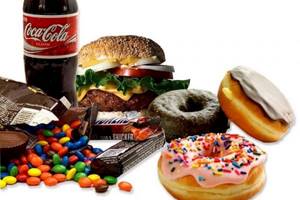
If you cannot exclude unhealthy foods from the menu, then eat them in the first half of the day. This will allow you to quickly restore the energy reserves lost during sleep. After lunch, it is better to refuse the delicious cake, leaving it until the next morning.
Be sure to read: Tryptophan: what is it, what is it for, what products it contains, daily intake
The permissible dose of organic matter is different for each person depending on individual parameters. The body requires 3 grams of this substance per kilogram of weight. Based on this, you can independently calculate the required dose.
For example, a person weighs 80 kg, which means he can eat up to 300 grams. Please note: if you lead a sedentary lifestyle, the amount of substance per 1 kg will have to be reduced to 2 g.
The norm of fast carbohydrates, and the dangers of their excess
The norm is to consume 40 g of fast carbohydrates per day . An excess of this substance has a negative impact on human health:
- Body weight increases.
- Metabolism is disrupted.
- Changes in blood pressure occur: it may suddenly increase or decrease.
- Dermatitis, swelling, and cellulite occur.
- Diseases of the gastrointestinal tract develop.
- The likelihood of developing caries increases.
It is important to consume these carbohydrates within normal limits to avoid the development of diseases.
The main reasons why you should not give up carbohydrates when losing weight
- While maintaining a diet, you cannot completely abandon the consumption of carbohydrates, including simple ones. The reason is that they are the main source of energy for the body, without which mental and physical activity is impossible.
- Carbohydrate foods are very satiating. Nutrients are found in many foods that taste good and are highly filling. Consumption of these products allows you to quickly feel full and eliminate the discomfort of hunger that usually accompanies a diet. You just need to replace simple ones with .
- Carbohydrate-free metabolism - ketosis - is practically impossible under normal conditions; this is fraught with negative consequences for the body, which are very difficult to eliminate. You can only engage in such severe carbohydrate-free diets under the supervision of an experienced person.
- Proper weight loss requires moderation. There is no point in going to extremes. When it comes to health. Switching completely to protein foods leads to metabolic disorders, breakdown, and the result from the diet will be minimal or zero. In this case, the person will experience constant stress.
You cannot achieve positive long-term results by following a strict diet, drinking excessive amounts of weight loss tea, or eating miracle pills. You should organize your nutrition properly. At the same time, you can find a place in your diet for fast carbohydrates; the main thing is to know when and in what quantities you can consume them.
What are fast carbohydrates and where do they “live”?
Monosaccharides are the simplest compounds that the body spends minimal energy on processing. Most of the carbohydrates go to the muscle mass and liver, where they are stored in the form of glycogen. Part of the energy is spent on maintaining life. With insufficient physical activity, excess is safely deposited as fat deposits. The body does not expend as much energy as it receives, and it stores excess carbohydrates in reserve.
We can say that only an excess of carbohydrates has a negative effect on your figure. And people get fat from eating not fatty foods, but high-carbohydrate foods. At the same time, it is advisable to reduce the amount of fast carbohydrates, but not give them up completely.
If you approach your diet wisely, you can not limit yourself to your favorite dishes, but wisely distribute the energy that comes from food. To do this, you can change your habits and lifestyle. So, what do fast carbohydrates contain?
List of products, weight loss table, features
Simple carbohydrates are found in large quantities in the following foods:
- Sweets: granulated sugar, honey, jams and berry syrups, condensed milk, sweets and cookies. This group does not include stevia and sweeteners;
- Dried fruits. According to a food expert, the sugar concentration in dried fruits is higher than in fresh ones;
- Fresh fruit also has a high sugar content; this can include sweet drinks, which do not bring any benefit and do not satisfy hunger;
- Baking: pies and gingerbreads, cakes and buns, white bread. All products containing flour or sugar. These products can be safely excluded from the diet of people who play sports and want to lose weight. They can easily be replaced with foods with moderate GI:
- Fresh fruits, it is recommended to consume mostly apples and citrus fruits;
- Berries, and carbohydrates are contained in lower concentrations in sour berries;
- Vegetables. Even potatoes can be included in the diet menu, but only boiled or baked.
How to lose weight with fast carbohydrates?
If you have read the list of products and the weight loss table, you probably still have questions - how? Why do such seemingly high-calorie foods help you lose weight? However, they are in vain considered enemies of the female figure. Fast carbohydrates simply need to be consumed correctly, then there will be no threat to your waistline. Few people are able to completely refuse their favorite chocolate or cake for a colleague’s birthday. To avoid problems, you should use the following rules:
- Time. Sweet tooth lovers can indulge in such products, but only in the first half of the day. Until 12 o'clock the body processes sugar more easily, and in the late afternoon the body stores excess carbohydrates in fat layers.
- The company plays a very important role. If you consume fiber, pectin and protein along with sugars, carbohydrate absorption will slow down. Therefore, you should give preference to such delicacies as marmalade, marshmallows, curd desserts, and baked fruits.
- Don't get carried away! And after eating sweets in limited quantities, it is worth loading your body physically. For example, take a walk to a distant cafe at lunch, preferring to go up and down the stairs rather than take the elevator.
When should you eat fast carbohydrates?
There is a scheme for consuming simple carbohydrates, and it is as follows:
- Proteins and fast carbohydrates must be consumed after active physical activity! In this case they will be useful.
- Physical activity is mandatory for those losing weight, especially when a person is unable to give up sweets. If a woman is very overweight, heavy exercise is contraindicated for her. The best and safest solution in this case is swimming. After just three months of regular exercise, it will be possible to move on to more serious exercises, and the woman will feel renewed.
- Sweets after exercise are the best way to support the body and restore lost energy. Experts recommend consuming fast carbohydrates within an hour after finishing classes. An excellent option for sports nutrition is a protein-carbohydrate shake, which is a protein shake with the addition of banana or honey.
And finally, more about carbohydrates and the glycemic index:
It is very difficult to give up sweets, so you should consume fast carbohydrates wisely. Stick to the list of allowed foods and the weight loss table, then they will not cause harm, but on the contrary, they will help you maintain your figure and a great mood!
Let's find out what fast carbohydrates are, and also look at the table and list of foods containing unhealthy carbohydrates with a high glycemic index.
We know that bread, sweets and a long list of favorite foods are rich in carbohydrates. And those, in turn, are slow and fast. Where do these names come from? What is this division based on?
How to correctly name carbohydrates: simple or fast

What is the correct name for them? Technically, it doesn't really matter whether you call carbohydrates simple or fast. Both reflect aspects of their processing in the body.
- They are really simple. There are several classes of substances, carbohydrates. These are processed in one stage. That is, they enter the body almost ready to be converted into energy. The body does not have to undergo many biochemical manipulations to achieve a beneficial result.
- They are really fast. All for the same reason. If complex carbohydrates take up to several hours to release energy and be completely processed, everything is much faster here. In 10-40 minutes the process is completed. This is why simple carbohydrates are so dangerous for diabetics: they quickly and significantly increase glucose levels.
Thus, the terms “fast” and “simple” carbohydrates are complete synonyms. Therefore, you can call the substances whatever you want, there will be no mistakes.
Simple carbohydrates have a significant glycemic index. What does this mean in practice? The point is that foods that contain simple carbohydrates are very quickly converted into energy, increasing blood glucose levels.
Important! The glycemic index is a conditional value. Pure glucose is taken as the standard. She has a GI of 100 units. That's a lot. A few grams are enough to trigger a sharp release of insulin. Within a few years there is a real chance of developing diabetes.
To calculate how much load a particular product will create on the body, a special formula is used.
Glycemic index of the product/100 * per amount of carbohydrates in the product in grams = glycemic index of a serving of food
Let's give a few examples.
- You decide to eat a 150 gram portion of rice noodles. Let's assume empty, without adding other products. The glycemic index of rice noodles is 95 units. 100 grams of rice noodles contain 83 grams of net carbohydrates. Accordingly, in 150 grams there will already be 83 + 41.5 = 124.5 grams. This is what we will proceed from. According to the formula:
95/100 * 124.5 = 118.2
Is it a lot or a little? Quite a lot, considering that the body will quickly process the substance and it will turn into glucose.
- Another example. We have 100 grams of persimmon. The glycemic index of the fruit is 50 units. The amount of carbohydrates per 100 grams is 33.5 g. According to the formula:
50/100 * 33.5 = 16.75
That is, 100 grams of persimmon is equivalent to 16.75 grams of pure glucose. This is already quite small, because blood sugar will not rise as significantly as when consuming, for example, rice noodles.
Let's summarize how to calculate the load on the body when consuming a particular product:
- We look at the glycemic index of the product using a special table.
- We look at the amount of carbohydrates per 100 grams of a particular product.
- We calculate the amount of carbohydrates for the amount of product contained in your serving.
- Divide the glycemic index by 100.
- We substitute the numbers into the formula and get the desired result.
The calculations are especially useful if you are watching your diet or have diabetes.
Fast carbohydrates: to eat or not?
The more active a person’s lifestyle, the more intense physical activity, the more sugars the body requires. But even those who are not athletes or loaders should not completely exclude sweet substances from their diet. They provide the body with more than just calories. The function of simple carbohydrates in a cell is that they act as their structural elements; without these compounds, muscles, liver, and heart will not be able to function normally.
A chronic lack of glucose is no less dangerous than an excess. Without replenishing this substance, a person will be lethargic, drowsy, and the brain, the main consumer of energy, begins to suffer.

In extreme cases, this can lead to mental disorders and even coma. In addition, there are cases when glucose helps improve well-being:
- after operations and serious illnesses;
- in case of dehydration, intoxication;
- after vomiting, diarrhea;
- to support liver and heart activity.
Nature also designed it so that sweet fruits and juices from them contain essential vitamins, minerals, fiber, and honey is a concentrate of unique substances important for health. No matter how strange it may sound, there are healthy carbohydrates and even healthy fats that are necessary for the human body.
